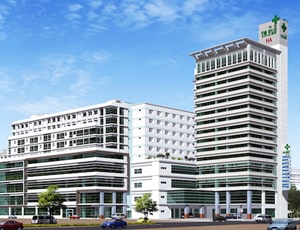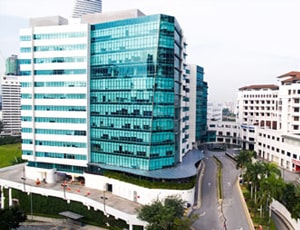Total Anomalous Pulmonary Venous Connection (TAPVC) or Total Anomalous Pulmonary Venous Return (TAPVR) is a rare congenital disorder characterized by a malformation in all the four pulmonary veins that carry oxygenated blood from the lungs to the atrium. The malformation is such that the veins do not connect to the left atrium perfectly.
In case of TAPVC, the four pulmonary veins drain into the right atrium because of an anomalous connection. There are different TAPVC types, depending on where and how the pulmonary veins drain into the right atrium. The common TAPVC types include supracariac, cardiac, and infracardiac TAPVC.
All types of TAPVC are corrected with the help of a surgery, which is conducted during infancy itself. Additionally, all types of TAPVC almost always have an atrial septal defect (ASD), which requires a separated surgery for its closure. An ASD is a hole between the upper two chambers of the heart. As a result, some amount of oxygenated blood from the right atrium is transferred to the left atrium and out from the body.
TAPVC is detected as soon as the baby is born or even before. The following are some of the main TAPVC symptoms:
TAPVC repair is an emergency procedure conducted as soon as a newborn is born with an obstructive TAPVC. Some of these infants are put on extracorporeal life support (ECMO) before TAPVC repair because blood flow in their body is highly unstable.
It may take a few days to a few weeks before a surgery for TAPVC repair is conducted. The exact approach used to repair TAPVC depends on the type of abnormality that the infant has and the overall condition of the infant. The surgeon may decide to conduct a few tests to check where exactly the pulmonary veins are draining into the atrium. A TAPVC complicated by atrial septal defect is best repaired after a balloon dilation procedure at cardiac catheterization. Balloon dilation before TAPVC is performed with an intention to improve the health of the child.
Some of the following additional tests may also be performed:
TAPVC repair is conducted as soon as the condition is diagnosed, which may happen during pregnancy or after the birth of the baby. However, the exact time as to when the repair is conducted depends on the overall health of the baby. During TAPVC repair, the neonatal cardiac surgeons connect the pulmonary veins to the back of the left atrium to restore the normal flow of blood to the heart. Additionally, they also close off any abnormal connection between the pulmonary veins. The TAPVC repair procedure does not end there. The last step in the repair mostly includes the closure of the ASD. Prior to the surgery, the body of the child is connected to an artificial heart-lung machine. The machine is disconnected as soon as the normal beating of the heart is restored after making doing all the corrective repairs.
TAPVC repair success rate is excellent with over 95 percent success rate in children who are treated electively. A child or an adult may undergo TAPVR surgery successfully, however, that does not mean that it is fully cured. They will have to attend follow-up appointments with the surgeon in the future on a regular basis. The success rate, on the other hand, is low when the procedure is conducted on an emergency basis in critically-ill infants. Even if infants do survive after undergoing emergency TAPVC repair procedure, they will be kept under a prolonged post-surgery intensive care. They are also put on a ventilator machine to assist breathing.
Even is the repair is successfully handled, the patient is required to attend follow-up session with the surgeon for the rest of your life. During the follow-up appointments, the surgeon will check the progress and keep a tap on health conditions that may develop as the child grows into an adult. Most of the children who undergo TAPVC repair and ASD closure are able to grow and develop normally. Abnormal cardiac rhythm and obstruction in the pulmonary veins are the two post-surgical complications that may rarely occur.
TAPVC repair is a critical procedure that must be performed only by an experienced pediatric cardiology. The life of the infant, in the case of TAPVC, largely depends on how well the procedure has been conducted and this is the reason only an experienced surgeon working at a reputed hospital must conduct this procedure. TAPVC repair cost in India is much less than the Western countries. This is despite the fact that the quality of services offered by the top heart surgery hospitals in India is at par with some of the leading hospitals in the world.
The following table highlights the cost of TAPVC Surgery in India and some of the other popular medical tourism destinations:
| Treatment cost in India: | 7520 |
| Treatment cost in Turkey: | 9000 |
| Treatment cost in United Arab Emirates: | n/a |
| Treatment cost in Israel: | 60639 |
| Treatment cost in Singapore: | 70000 |
| Treatment cost in Thailand: | n/a |
| Treatment cost in South Africa: | n/a |
| Treatment cost in Greece: | n/a |
| Treatment cost in Lithuania: | n/a |
| Treatment cost in Spain: | 21000 |
| Treatment cost in Hungary: | n/a |
| Treatment cost in Malaysia: | n/a |
| Treatment cost in South Korea: | 50000 |

Tel Aviv, Israel
Assuta Medical Center is a leading private hospital in the capital city of Tel Aviv in Israel. Assut...more
![]() Accommodation
Accommodation
![]() Airport Transfer
Airport Transfer
![]() Choice of Meals
Choice of Meals
![]() Interpreter
Interpreter

Bangkok, Thailand
Yanhee Hospital is one of the best multiple-service hospitals in Bangkok, Thailand offers a wide spe...more
![]() Accommodation
Accommodation
![]() Airport Transfer
Airport Transfer
![]() Choice of Meals
Choice of Meals
![]() SIM
SIM

Kuala Lumpur, Malaysia
History Parkway Pantai Hospital in Kuala Lumpur, Malaysia is operating under the Parkway Pantai gro...more
![]() Accommodation
Accommodation
![]() Airport Transfer
Airport Transfer
![]() Choice of Meals
Choice of Meals
![]() Interpreter
Interpreter
Q: What is the TAPVC success rate?
A: The success rate is around 95 percent in care of patients who undergo TAPVR repair as an elective procedure. The success rate is low in the case of infants who undergo TAPVC repair as an emergency procedure.
Q: Is surgery always necessary for TAPVC?
A: Yes, the surgery is always necessary for repair on TAPVC. It can be postponed or delayed but can never be cancelled.
Q: What are the most common risks of TAPVC surgery?
A: Infection, excess bleeding, death, complications from anaesthesia, heart block, and abnormal heart rhythms (arrhythmias) are some of the rare risks of TAPVC repair.
Q: What can help reduce risks of TAPVR?
A: Prior to the repair, the surgeon may conduct a few side treatments to stabilize the health of the patient and reduce the risks of TAPVC repair. These include oxygen therapy, mechanical ventilation, and extracorporeal membrane oxygenation (ECMO).